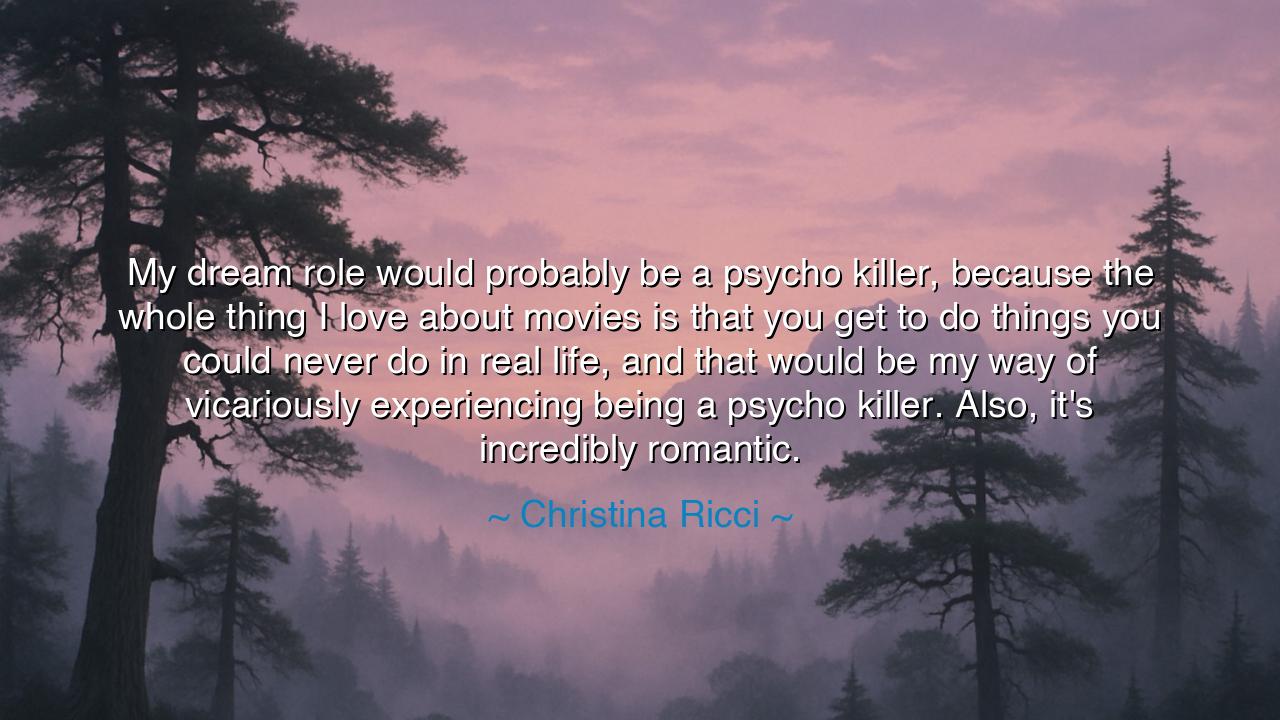
My dream role would probably be a psycho killer, because the
My dream role would probably be a psycho killer, because the whole thing I love about movies is that you get to do things you could never do in real life, and that would be my way of vicariously experiencing being a psycho killer. Also, it's incredibly romantic.






"My dream role would probably be a psycho killer, because the whole thing I love about movies is that you get to do things you could never do in real life, and that would be my way of vicariously experiencing being a psycho killer. Also, it's incredibly romantic." – Christina Ricci. In these words, Ricci reveals the deeply complex nature of human desire, imagination, and the power of storytelling. She speaks of the vicarious experience of living out a fantasy—one that is extreme, dark, and dangerous—through the safety of cinema. In doing so, she taps into a long-standing tradition of exploring the darker, more complex sides of human nature through art and performance. The quote also invites us to reconsider the idea of romance and violence—two seemingly opposed forces that, in the context of fiction, can be intertwined in powerful ways.
In the ancient world, tragedy was often a vehicle for exploring the extremes of human experience. The great playwright Aeschylus, whose works are among the foundational texts of Greek theater, understood the deep connection between violence and the human condition. In plays like The Oresteia, violence is not simply an act of destruction, but a means of catharsis, a way for the audience to confront their deepest fears and desires. In the ancient theater, the tragic hero often moved toward destruction because of a fatal flaw, and the audience, through witnessing these extremes, gained both insight and cleansing. In much the same way, Ricci’s dream role as a "psycho killer" suggests a desire to engage with the darker side of humanity, to step into the role of someone who is not confined by the conventional limits of morality.
This tension between violence and romance is also reflected in the story of Antony and Cleopatra, where love and ambition collide, leading to both romantic devotion and destructive outcomes. Their relationship, one of intense passion, is laced with political intrigue, betrayal, and ultimately, death. Their love, in its most extreme form, becomes a force that not only destroys their lives but changes the course of history. Theirs is a love that both elevates and consumes, demonstrating the power of romantic emotion to lead individuals down paths of self-destruction. In Ricci’s reflection, we see that the romantic ideal does not always need to be gentle or serene—it can also be intense, dramatic, and even dark.
The notion that the role of a "psycho killer" could be considered romantic may seem shocking at first. Romanticism in literature and art is often associated with beauty, idealism, and love, yet Ricci’s words remind us that the romantic imagination is capable of exploring all aspects of the human experience—both the light and the dark. Romanticism, as defined by William Blake and other poets, is not just the pursuit of beauty but the embrace of intensity, conflict, and the power of the unseen forces that drive human behavior. In this sense, the "psycho killer" archetype is romantic because it explores the depths of human emotion and the twists of fate that propel people toward their darkest impulses.
Consider the historical example of Lord Byron, the famous Romantic poet who embodied many of the traits Ricci speaks of. Byron’s life was marked by passion, recklessness, and a deep inner turmoil that led to both great poetry and personal destruction. He became, in a sense, his own tragic hero, driven by desires that pushed him beyond conventional limits, much like the romanticized anti-heroes of modern cinema. Byron’s work often explored themes of self-destruction, violence, and the fragility of the soul, embracing the notion that romantic passion can be both transformative and destructive. In this context, the "psycho killer" that Ricci fantasizes about is not so far removed from the figures of Romantic literature—individuals whose extremes of emotion and action are what make them compelling.
The lesson to be drawn from Ricci’s words is the recognition of the power of imagination and the exploration of extremes in understanding the human experience. In life, we often shy away from our darker inclinations, pushing them into the subconscious or labeling them as shameful. Yet art—whether in literature, theater, or film—allows us to confront these darker impulses safely, to examine them, and to learn from them. By engaging with these extremes through fictional representations, we gain insights into our own motivations, fears, and desires. Ricci’s desire to play a "psycho killer" is not a glorification of violence, but a recognition of the power of storytelling to push the boundaries of human experience, forcing us to confront our shadow selves.
In our own lives, we must also be willing to explore the depths of human emotion—not just the light and peaceful aspects of love, but the intense, sometimes dangerous emotions that lie beneath the surface. This does not mean acting upon destructive impulses, but rather understanding them, accepting that the full spectrum of human experience includes both beauty and darkness. Like Ricci’s dream role, we must engage with the extremes of life, not to be consumed by them, but to understand how they shape who we are and how we relate to the world. By embracing the fullness of the human condition, we can find a deeper sense of balance and wisdom, learning from the darker aspects of our nature without being overwhelmed by them. Through this, we can live more authentically, not just in the light but in the complexity of our entire being.






AAdministratorAdministrator
Welcome, honored guests. Please leave a comment, we will respond soon